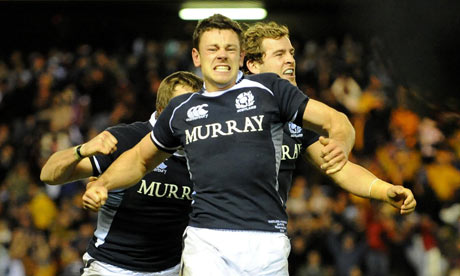
Defence is such an integral and obvious part of rugby that to praise its efficiency on one particular day is like expressing wonder at the workings of a red traffic light. It's there and stopping things is what it does. End of story.
Except that the quite remarkable story of how Scotland broke a sequence stretching back 27 years and 16 games since last they beat Australia went way beyond the everyday and was founded exclusively on how they defended. This was a folkloric refusal to give in, with a well-ordered line that reflected earnest rehearsal in training, and that, when breached, was instantly replaced with a spontaneous scramble.
Scotland's appetite for tackling was straight from the pages of a rebellious history of ignoring the odds and piling in. At its brave heart was John Barclay, an open-side wing forward built for a more elegant game of supporting sweeping moves and linking neatly, but here wading through the sodden turf of Murrayfield to stop runners stone-dead or delay release of the ball until reinforcements might muster at the next point of danger.
It is part of the back row's job description to perform such duties, but what Chris Cusiter did to prevent Stephen Moore from scoring was beyond the call. This is his citation for a medal: having clearly knocked himself out moments earlier, by hitting his head against the hip of a much larger opponent, the scrum-half, while still distressed, tracked back, wriggled under Moore on the line and prevented him from grounding the ball. Through his fug, courageous instinct took over.
In such praise of Scotland's tacklers lies the other side of the story. Moore should have gone low for the line. He could have dived and surfed over, but instead stayed upright.
The hooker was not the only one to blow a try. Matt Giteau tossed a short pass on to the ground, yards from the line in the second half. Quade Cooper threw a long pass, forward, to Drew Mitchell when all the centre had to do was keep things simple. A mid-range pass would have done the trick.
At the heart of the malfunctions was Giteau. It was not just the pass that went astray. He missed a simple penalty in the first half, and a drop goal from almost in front of the posts. It meant the scores were tied at half-time through a penalty apiece, although the pie-charts of possession and territory were exclusively golden. Australia were not just camped in Scotland's half; they were squatters that could not be shifted.
The colour did not change much in the second period. The tally of balls won by Australia in Scotland's 22 mounted steadily towards the half-century. Scotland never reached double fingers in the Wallaby 22.
But nobody could score. Giteau was wide with another penalty and his team were denied again by the television match official, a second example of not being able to ground the ball.
Would Scotland ever be able to break out? They would, with a hack downfield by Nick de Luca and a collective bolt for fresh pastures by the pack. The result was a penalty wide out, a tricky kick for Phil Godman who underestimated the strength of the wind.
This was, however, a sustained breakout and soon Godman was lining up a second kick from the same position. This time he started the ball wider of the posts and through it went, bouncing first off the more distant of the swaying uprights.
Then came a drop goal from Chris Paterson. Three chances had come Scotland's way and they had nabbed six points, irritating interruptions to the assaults on the line at the other end. They meant Australia would have to score a try – and convert it.
With the same agonising slowness as the hands of the clock turned for the home crowd, the visiting forwards, with Rocky Elsom and Dean Mumm in the vanguard, churned towards the goal line. They were stopped beneath the crossbar. Yield here and the game was Australia's. Not even Giteau with the yipps could miss from in front.
Scotland held firm inches from their line. Australia had to take the ball wide, where at last the defence, in overtime, gave way and Ryan Cross went over. This brought Giteau back on centre stage, one of the world's best forced to confront his demons on the day and take the conversion that was neither close enough to be a sitter, nor wide enough to be a forgivable miss.
Giteau scowled at the ball, part of his familiar routine, only this time not a passing expression, but a doubt locked on his brow. The kick sailed well wide, a triumph for the demons. And, of course, a victory for Scotland's defence.
Scotland R Lamont; S Lamont, Grove, Morrison (De Luca, 40), Danielli (Paterson, 63); Godman, Cusiter (R Lawson, 21); Jacobsen, Ford (Hall, 77), Low (Traynor, 57), Hines, Kellock, Strokosch (White, 48), Barclay, Beattie (Vernon, 63).
Australia Ashley-Cooper; Hynes, Cross, Cooper (O'Connor, 74), Mitchell; Giteau, Genia (Burgess, 63); Robinson (Kepu,17), Moore (Polota-Nau, 46), Alexander, Horwill, Chisholm (Mumm, 50), Elsom, G Smith, Palu (Brown, 66).

